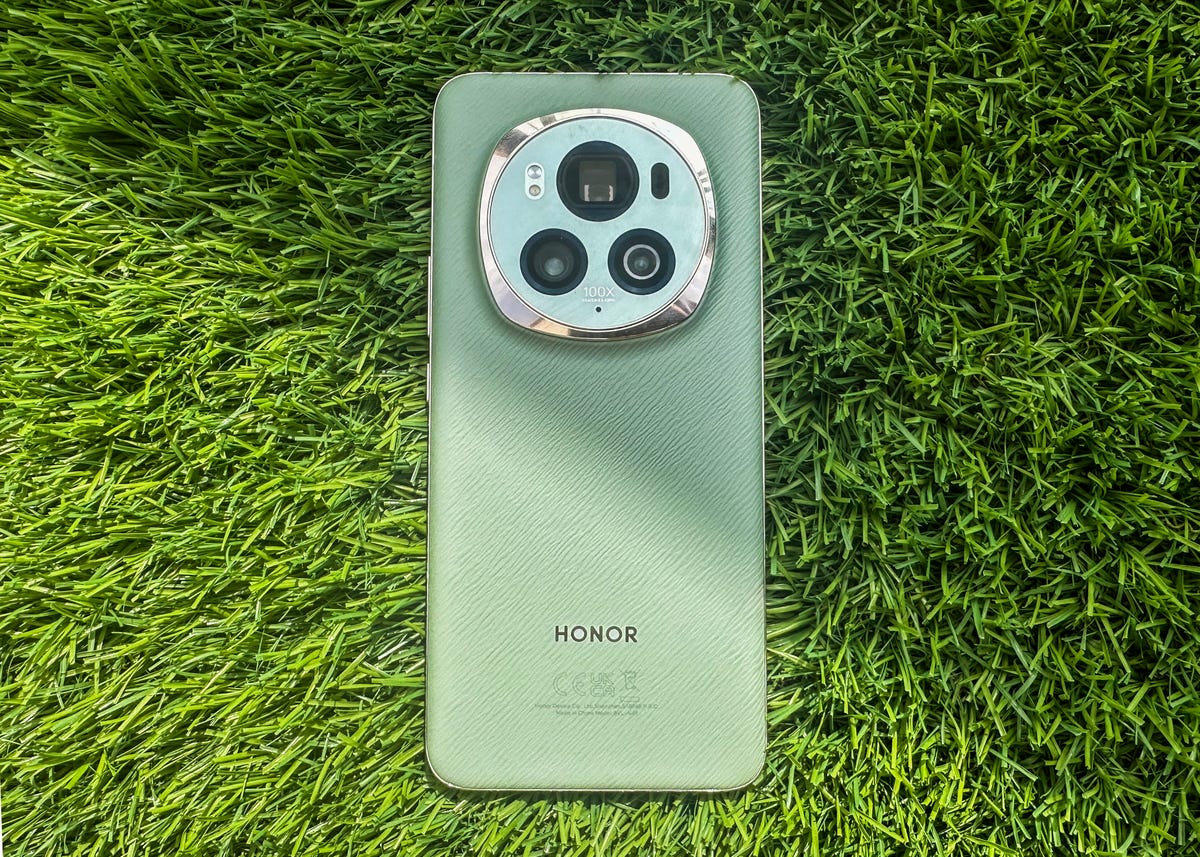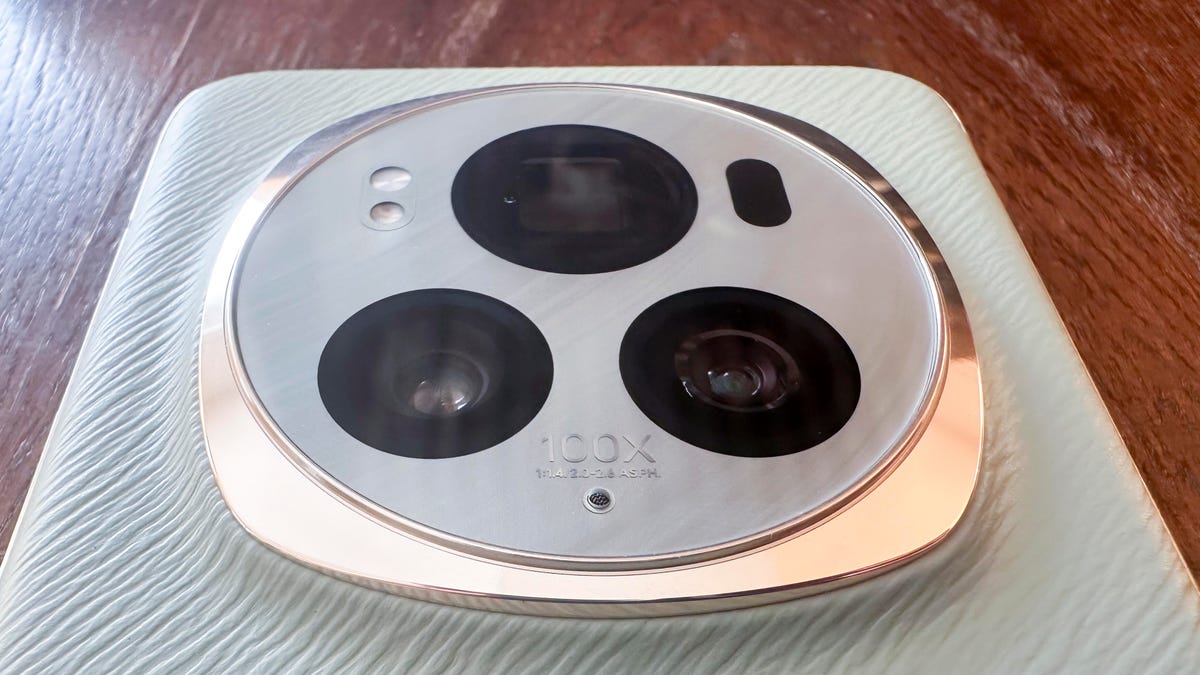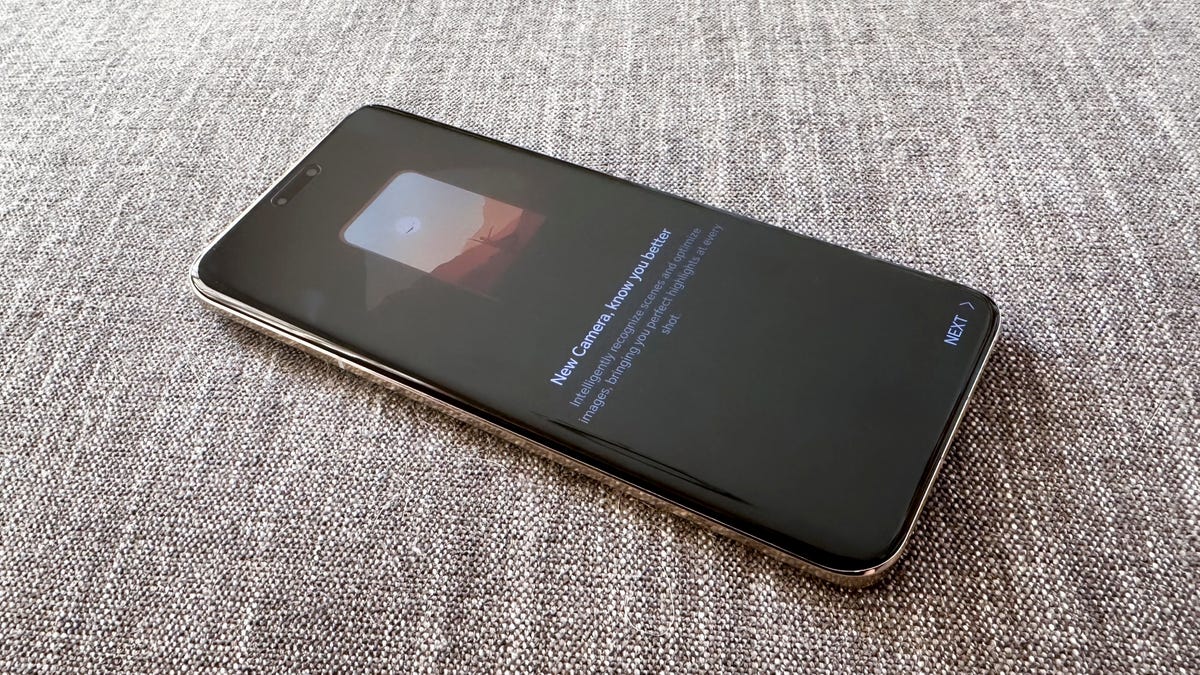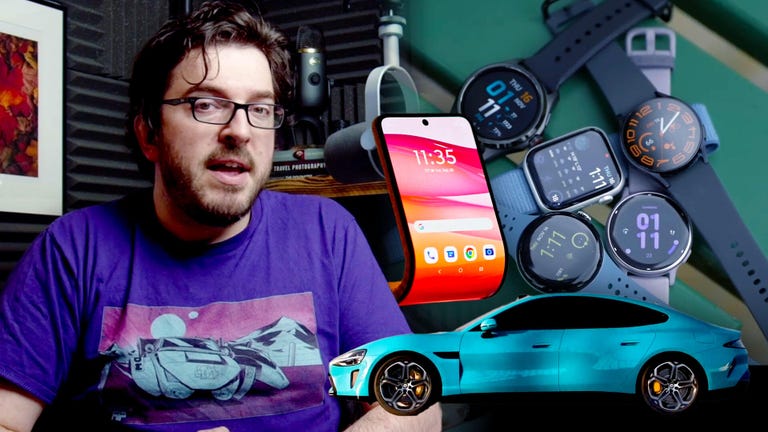
Honor may not be a global household brand like Apple or Samsung, but the Chinese company is clearly determined to make a name for itself. And the new Magic 6 Pro appears to be designed squarely with that in mind.
Honor’s Magic 6 Pro, which made its debut at Mobile World Congress, is the world’s first phone sold outside China that carries a silicon-carbon battery, which researchers say has a lower environmental impact and risk from overheating than lithium ion batteries used in a majority of phones.
Read more: Best Phone To Buy For 2024
What’s more, the Magic 6 Pro offers a novel way to interact with it, using an AI eye-tracking feature that allows you to open and interact with apps using your eyes. While international versions of the Honor Magic 6 Pro don’t have eye-tracking, the feature is expected to roll out in the future. Here’s a demo video where Honor shows off the possibilities of its eye-tracking technology.
Apart from those innovative features, the Magic 6 Pro has many of the specs and features you’d expect from a 2024 flagship phone. I spent nearly a week testing the Magic 6 Pro, which delivers a solid Android experience packed in a luxurious hardware design. Thanks to its sharp display, slow-draining batteries, excellent cameras, zippy processor and those innovative AI-based tools, the Magic 6 Pro will likely be one of the most compelling Android phones of 2024. But it’s worth noting that the Magic 6 Pro is not scheduled to receive a release in the United States. It’ll first be released in Europe, costing £1,100 in the UK (roughly $1,390 and AU$2,120).
Despite all its advantages, the Magic 6 Pro is not perfect. Perhaps its biggest drawback is Honor’s software upgrade policy, which lags behind rivals such as Google’s Pixel 8 line and Samsung’s Galaxy S24 series, which offers seven years of major OS upgrades and security updates. Instead, Honor promises four years of Android updates and security patches, which is still respectable, although it’s shorter than its rivals. I also found its display collected dust, debris and even tiny scratches — remember I’ve only used it for six days.
Honor has clinched a string of firsts with its phones after it was sold off by Huawei a few years ago. The Chinese company debuted the world’s thinnest and lightest book-style foldable phone in 2023, the Honor Magic V2. Before that, it launched the world’s first phone with a silicon carbon battery, the Magic 5 Pro, which is the Magic 6 Pro’s predecessor. But those batteries were only used in phones for Honor’s native China market.
Read More: Life After Huawei: Honor Bids To Become ‘Iconic’ Global Phone Brand

Luxury-inspired design
As soon as I took it out of the box, I could tell that Honor wants its newest phone to stand out. The model I received comes in a calming sage green color, which I think pairs well with the gold-colored finish around the camera bump and body. It has a textured rear finish as well as a cushion-shaped camera bump. Honor says it drew inspiration from jewelry and classical timepieces. The camera bump is bulky, however, so the phone doesn’t lie completely flat on surfaces. On the front, the Magic 6 Pro’s screen has subtle, curved edges.
Vibrant but delicate display
The 6.78-inch display on the Magic 6 Pro is easily visible outdoors, even when sunny. Thanks to its zippy refresh rate of 120Hz, making it a smooth and seamless experience to switch between apps and scroll on social media. But I was surprised to find that the screen suffered some visible wear and tear during my limited time with it. I popped the phone into a tote bag over the course of a few days without a case and found that it easily collected dust and debris on the screen. After a few days, I also found several small scratches on the phone. Honor says its Magic 6 Pro’s screen uses a nanocrystal glass.

The Magic 6 Pro’s cushion-shaped camera bump.
Wonderful cameras
The Magic 6 Pro’s so-called falcon camera system has a total of four cameras. The rear camera module is headlined by a 2.5x telephoto lens with an f/2.6 aperture to let in more light. It has a 108-megapixel sensor and can zoom digitally up to 100x. Apertures under f/2.8 are considered fast, which basically means the lens lets in a bunch of light. You can opt for a fast shutter speed, which results in bright, crisp images with little to no image noise. f/1.7 and f/1.6 are some of the widest apertures found on a phone camera lens. For context, full-frame standalone cameras like the Leica M series or Sony Alpha series have lenses with apertures under 1.
The telephoto camera is accompanied by a 50-megapixel wide camera and a 50-megapixel, ultrawide camera. On the front, there’s a 50-megapixel camera. Take a look below to see the cameras in action.

Hong Kong skyscrapers by day. Taken with the Magic 6 Pro’s main camera.
I love how the image above turned out. You can even see the reflection of the opposite building in the glass, but it appears artificially sharpened in the image.
The image below was taken on default settings on a bright and sunny day in Hong Kong. The Magic 6 Pro amps up the blueness of the skies and seas. I personally like it.

A photo of Hong Kong’s harbor from the main camera.
Below are a series of photos I took to show off the Magic 6 Pro’s zoom range. The first image was taken with the 0.5x ultrawide camera and the second with the telephoto camera at 5x digital zoom.

This was taken with the ultrawide camera. I’ll be zooming into the ship to show you the Magic 6 Pro’s zoom capabilities.

Standing in the same spot, I took this photo with 5x digital zoom.
But let’s take things to the extreme. Below is a photo I shot at 100x digital zoom. I’m amazed you can actually see a semblance of the ship’s front. I couldn’t see much with my naked eye except for a tiny silhouette of the ship. As you can expect, the image is blurry, but it gives you a rough idea of the subject.

And here’s a photo taken at 100x zoom, the Magic 6 Pro’s max magnification.
Now let’s zoom on something that’s actually physically nearby (and more adorable). The photo below of Rocky, my dog shows off the Magic 6 Pro’s telephoto capabilities. This is a sharp image taken in a well-lit room. Notice the strands of fur and detail captured.

I took this image of Rocky with the Magic 6 Pro 2.5x telephoto camera.
Portrait mode was one of my favorite features to use on the Magic 6 Pro. It’s easy to take beautiful portrait phones. I love the natural-looking bokeh in the background and the sharp foreground.

Here’s another photo of Rocky taken with portrait mode.
In my time so far with the Magic 6 Pro, it sometimes struggled with edge detection. Take a look at the images below of the heart-shaped balloon to see what I mean. The first was taken with portrait mode. Notice how it separates the balloon from the background. You can tell that the Magic 6 Pro struggles with “cutting out” the balloon and its string.

Here’s another portrait mode snap, but notice the way it “cuts out” the balloon from the background.
Below is another photo of the same balloon taken with portrait mode disabled. You can clearly see the balloon’s string as well as the background in this image, which was taken on default settings. The camera took a true-to-life shot of the balloon despite light pouring into the window.

The same balloon taken without portrait mode.

This photo was taken with the ultrawide camera in night mode.

Here’s the same scene captured with the ultrawide camera but without night mode.

And here’s the same evening scene captured at 5x digital zoom.
The Magic 6 Pro photos were solid. Images in most lighting situations were color accurate, crisp and visually appealing. Since the portrait lens has 108 megapixels to play with, zoom was also another stellar feature on this phone. I could take all sorts of images and digitally zoom into them, and each photo looks sharp. I can’t wait to take this phone to a tennis match and take some action shots.
If I had to nitpick, the camera tends to make skies bluer than they were and sometimes the ocean too. But I was happy with the final image, so this tendency to oversaturate photos didn’t bother me.
Sometimes portrait mode struggled with edge detection too, but again it was a non issue for me since it was usually an easy fix of just moving the camera slightly. Besides, it was a breeze to take beautiful portrait shots. I absolutely loved how I could easily take photos with a natural bokeh effect in the background yet retain a crisp foreground. The Magic 6 Pro probably has one of my favorite portrait cameras despite the minor edge detection issues.
Silicon carbon battery
This year’s Magic 6 Pro has a 5,600-mAh silicon-carbon battery. In my experience, the battery lasted throughout the day after moderate use. That includes quick phone calls, social media scrolling, reading emails, watching YouTube videos and listening to music.
I also ran a 45-minute battery drain test, in which I hopped on a Zoom call, scrolled through social media and played a graphic-intensive mobile game. In that time, the battery dropped by 8%. This result keeps up with gaming phones such as the Asus ROG Phone 8 Pro, which also dropped 8% in the same test, although that phone uses a lithium-ion battery. Most lineups, including the recently launched Samsung Galaxy S24, run on lithium ion batteries.
The use of silicon-carbon batteries in mobile phones is an emerging trend that’s drawn attention due to its potential advantages over lithium-ion batteries. Those benefits include a lower environmental impact and reduced risk of overheating. But the long-term reliability of silicon carbon batteries are still being researched, and adoption in the smartphone industry is still in its early stages.

A welcome screen greets you the first time you open the camera app.
Impressive performance
The Magic 6 Pro runs on Qualcomm’s top-of-the line Snapdragon 8 Gen 3, which promises a 30% improvement in CPU performance and a 25% increase in GPU performance. In my experience, the phone could handle virtually everything I threw at it, including graphic-intensive games such as Genshin Impact, running Zoom video calls and switching screens between a Zoom call and my email, for instance.
Apart from offering improved performance, the Snapdragon 8 Gen 3 chip will allow Magic 6 owners to tap into generative AI features wherever they are, even offline.
On-device AI
The Magic 6 Pro runs MagicOS 8.0, which is based on Android 14. Honor is billing its latest operating system as one “that really knows you” in a nod to the availability of AI-based features. But the most notable AI feature, which involves eye-tracking, is not yet available globally.
Like the Magic V2, the Magic 6 Pro has an AI-based feature known as Magic Text, which can recognize text content on an image and convert it into editable text. Like iPhone’s Live Text feature, I’d expect this feature to come in handy if you have handwritten recipes or notes that you want to digitize easily, as long as the handwriting is legible and clear. In my experience, it was intuitive to use. All I had to do was tap and select text in an image in the Gallery app, hit copy and then paste it into an email or wherever I needed the text.

Watch this: What to Expect from Mobile World Congress 2024
Overall thoughts
The Magic 6 Pro is among the most compelling Android flagships available this year. It has excellent cameras, a sharp display, and slow-draining batteries coupled with fast charging. It’s also the first commercial phone sold internationally that has a silicon-carbon battery. However it’s held back by the software upgrade policy and I am concerned about wear and tear on the display. That said, the Magic 6 Pro has helped reinvigorate my excitement around phones through its futuristic features such as eye-tracking, but I’ll have to see how advantageous it is in real life when I eventually get to test it out.




















+ There are no comments
Add yours